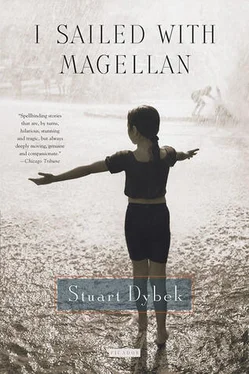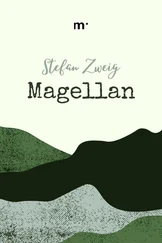“I like the carnations better for the house,” Mrs. Corea said. “The irises are pretty, but they don’t last.”
“Irises,” Stosh repeated, looking at me, then glancing away.
I shrugged, drained for a moment of everything but thirst.
“Let’s split,” he said and slammed out of the screen door.
“So long,” I said to his mother and the ladies.
“Stanley!” his mother exclaimed, looking past me out the door. “Oh, honey, don’t!”
I heard the hiss against the screen and turned to see the violet blur of his arm sweep down and smash the bouquet off the banister, violet petals exploding, and almost in the same motion their headless green stems scattering out over the yard. In the dazzling afternoon light it seemed as if the arc of an orchid aura hovered around Stosh before I realized the flowers had left a streak when he’d whipped them across the rusted screen of the back door.
By winter I had acquired a table and chair, but that late September I liked the place as bare as I’d found it, and was content to spread my lunch on the white kitchen windowsill and eat while staring out at the street below.
The street was bounded by the El tracks and a neighborhood cathedral, the name of which I didn’t know. It was a shadowy street with the amplified quiet of a dead end, except for the occasional clatter of the El and, at noon, the uniformed kids from the Catholic grade school playing during lunchtime recess in the culde-sac. The cross-tipped shadow of the steeple creeping along the pavement seemed to add an eerie dimension of echo, which made the lighthearted banter of their voices sound all the more riotous.
The window I sat propped in had been painted open. White paint slapped over cobwebs still foamed in the corners of the sash. Tiny white worms of paint uncoiled from the hinges of the kitchen cabinets. I’d snapped a butter knife prying at the painted drawers, trying to stash the silverware I’d borrowed, along with a pair of salt and pepper shakers, from a cafeteria.
The entire apartment wore this fresh coat of white, through which the inscriptions that generations of former tenants had left behind — bottle rings, phone numbers, initials carved into the woodwork — slowly reemerged. I wondered who my predecessors were, tried to imagine all that might have happened here, but there were no ghosts, no history other than what was waiting to happen, merely two unfurnished rooms, empty except for my saxophone case and portable typewriter, and the suitcase, heavy with too many books, that I’d dumped in the center of the floor.
I was living in exile from Little Village, in a place called the Loyola Arms Hotel, although it obviously hadn’t operated as a hotel for years. The rusted, burned-out neon sign in front had never been removed. It was my first apartment. The rent was cheap but still beyond my means after my friend Stosh, who was a Trotskyite that year and was to have been my roommate, moved into a place across town, closer to the University of Chicago, at the invitation of a Thai girl he’d been seeing. I didn’t blame him.
Had we split the rent as planned, I could have made it to next spring — at least by my most optimistic calculations — stretching out the money I’d managed to save while living with my parents. They’d been uprooted from Chicago, transferred to Memphis, when the plant where my father had worked for thirty years shut down and moved south. My father had managed to get me a job for the summer in the foundry with his company in Memphis — a situation I was desperate to escape.
So I left and came back to Chicago, ostensibly to return to school, and moved in anyway, imagining that I could live off the city like some form of urban wildlife — alley cat, rat, sparrow. I thought I could slip between the seams like the homeless foreigners who’d roamed through the South Side neighborhood where I’d been raised. I’d grown up studying them: tramps, bag ladies, panhandlers scavenging the alleys in summer like beachcombers; old black hobos fishing along the Sanitary Canal; urban hermits like the bearded mute known only as the DP, who lived in a cave hollowed out under a sidewalk on Twenty-first and Washtenaw, or the Mexican known as the Pigeon Man, who lived with the pigeons in a nest of cardboard cartons that he’d wedged among the girders of the Western Avenue bridge.
My plan was to live on Cheerios and baked potatoes. How much money did one really need, after all? Supermarkets offered free samples and bruised fruit. There were books and records in libraries, paper and pens in banks, toilet paper and paper towels in public rest rooms, soap and socks left in Laundromats. There was Army Surplus and Goodwill. It was September in America, days hazed in gold, streets lined with the largesse of produce stands and flower stalls; the city, to quote Stosh, loaded with bargains at the world’s expense. “In this country,” he said, “what amounts to merely surviving off the crumbs would be a life of privilege most anywhere else on earth.”
But my lunches were becoming extravagant. Picnics on a windowsill: braunschweiger, Jewish rye, mayonnaise, raw onion, potato salad blushing with paprika, a cold beer, an enormous garlicky sea green pickle tonged just minutes before at the corner deli by a young woman with high cheekbones and a Slavic accent, her golden hair stranding from turquoise combs that could hardly contain the weight of curls, ample breasts so loose they had to be bare in the sleeveless blue sundress she wore, and the blond hair growing profusely under her arms flashing as she dipped into a huge glass crock where a school of kosher pickles darted away and tried to hide amidst the dillweed, roiled seeds, and wheeling peppercorns.
Did she realize, looking at me when she seized a pickle and, raising it victoriously, smiled, that there are times in a life when a flash of the natural, humble hair beneath a woman’s arms can seem like a forbidden glimpse, a promise, of further mystery?
I’d walk back to the hotel, my lunch tightly wrapped in white butcher paper sealed with the strip of brown tape she’d licked. It was windy that fall, and the neighborhood smelled of whitecaps off the lake. The echo of noon bells from the church-locked street swirled in the vortex of doorways and mingled with the rasp of leaves and dust; pigeons and sheets of newspaper kited over the wooden platform of the Loyola station. The blind accordion player in an abandoned newsstand caught my arm as I passed, saying he smelled garlic.
“Take me to the turnstiles,” he said. “It’s so windy I can’t hear where I’m going.” And when I left him at the entrance to the El, he started pumping notes just as the northbound train slammed overhead like a part of the song catching up.
Late at night, through the painted-open window, I could hear the El train, stations away, rocking over the hollow viaducts of the North Side — Argyle, Thorndale, Granville, stops with names like English butlers — as I lay on the twangy, flop-out Murphy bed that a girlfriend once referred to as “the debilitated bicep of the Loyola Arms.”
Well, not a girlfriend exactly. She was the same girl who told me that she’d faithfully kept a diary from the time she was a child but that now she wrote down nothing, because recording things as they happen — exactly as they are — means that one is merely a journalist, and she was living her life like a novel.
“The Great American Novel?” I asked, but before she could answer I guessed that no, it was probably a Russian novel — pages of drifting snow, suffering, endless vodka-addled philosophical arguments, and at the end an appendix with a family tree that was necessary in order to follow the generations of characters with their unpronounceable names, names that required you to move your lips while reading.
Читать дальше












